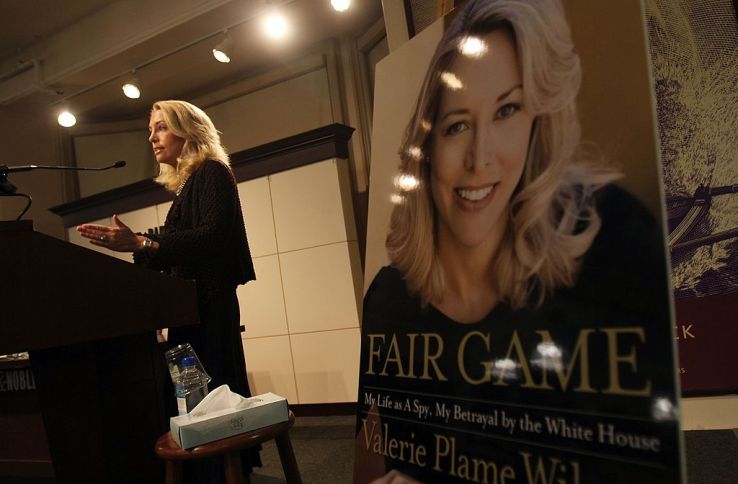Former CIA operative Valerie Plame says privacy is precious — and she should know

Back in 2003, Valerie Plame was working for the CIA overseas trying to protect the world from rogue nuclear proliferation — nothing too important or anything. Unbeknownst to her, she was about to become a pawn in a dangerous political game between the CIA and the Bush White House. It eventually escalated to the point where her identity was publicly exposed by an unnamed White House source as a covert operative in a July 2003 Robert Novak column in the Washington Post.
At the time, the Bush administration was searching for evidence that Iraqi leader Saddam Hussein was building weapons of mass destruction (WMDs) as rationale for sending US troops into the country. Plame’s husband, former ambassador Joseph Wilson, investigated a rumor that Iraq had been buying yellowcake uranium, a building block for nuclear weapons. Wilson found no such evidence. The White House didn’t like the answer, and that started the ball rolling that would eventually unveil Plame.
Plame, of course wanted nothing more than to keep her identity secret, so she could do her job. When her name showed up in that Novak column, her professional life as she had known it would quickly come to an end. She obviously couldn’t operate as a spy in the open.
“It was devastating. I loved my career. I was proud to serve my country. I had a great sense of satisfaction doing nuclear counter proliferation and my name was exposed for partisan reasons,” Plame told TechCrunch in a recent interview.
Trying Times
She explained that it was a difficult time for her and her family. Plame and her husband were being impugned by powerful political forces. It taught her a valuable lesson about privacy, one that is even more applicable in the internet age. “My take is, privacy is precious,” she said. “I think privacy is the last true luxury. To be able to live your life as you choose without having everyone comment on it or know about.”
Even in 2003, long before Twitter and Facebook, Plame and her family had to endure the white hot media spotlight. Photographers camped outside her house. As she put it, “It consumed Washington.” The story was later told in the 2010 movie Fair Game with Naomi Watts and Sean Penn.
I think privacy is the last true luxury. To be able to live your life as you choose without having everyone comment on it or know about.
We who work in the technology industry tend to think of identity differently than the rest of the world. For us, it’s about having the correct credentials to access computers, systems and services. If you can prove you’re you, you’re in. For that reason, you want to keep those credentials secret — and too often they are stolen.
Plame was a keynote speaker in June at the Cloud Identity Summit in Chicago, a conference that explores the concept of computer identity in depth. She sees a connection between what happened to her and computer identity. “To be able to protect identity and make sure it belongs to the human it’s attached to, for all sorts of reasons, is crucial,” she said.
Security vs. privacy
Then there is the issue of privacy on the internet. Plame is certainly in a position to understand the tension between security and privacy, perhaps better than anyone, both because of her CIA background, and what happened to her when her name was revealed. It’s telling that she is under no illusions.
“There are two sides [to privacy]: the corporate side, which is doing this to sell you more [stuff]. Then there is the government area and a whole other area with the NSA and their efforts to keep us safe — and it has spilled over into privacy. There is an ongoing tension between security and privacy,” she says.
But she warns that Americans shouldn’t be too trusting of the government, even when they seem to be conducting surveillance for the right reasons. She said the Snowden revelations jump- started the conversation about how much information we think the government should be collecting about us.
“[Surveillance] is an enduring fact of modern life. Americans [seem to be] cool with Americans seeing their stuff. I don’t think they understand implications. When they have that much information, historically we have seen that they don’t handle it as carefully as one might hope,” she said.
Further, she sees that same tension when it comes to protecting identity. We want to protect access to our accounts online, but at the same time, we don’t want to jump through hoops to achieve that. She said there is always someone trying to steal those identities, but at the same time we don’t want to enter a 15-digit password to access our bank account. Perhaps, she jokes, it would be better to buy a farm and go off the grid.
While that probably isn’t possible for her or her family at this point, who have learned to live in the spotlight, at least on occasion, she does understand the implications of privacy and identity, perhaps better than anyone. When she was exposed, it truly was a matter of life and death.
Featured Image: Mario Tama/Getty Images